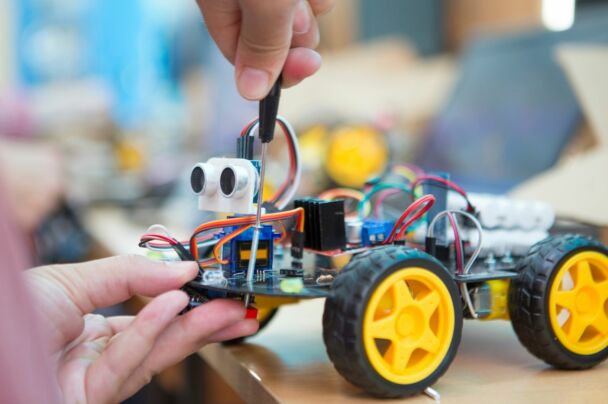Description
Advanced Computer Proficiency required. Read more »
Advanced computer proficiency courses are designed for individuals who have a solid foundation in computer skills. Participants will further enhance their knowledge and abilities by exploring advanced concepts and tools, such as programming languages or 3d printing.
Robotics, an exciting and rapidly developing field, has emerged as a cornerstone in modern education.
It is not just about building machines; it is a gateway to developing critical thinking, creativity, and problem-solving skills among learners.
Unlike any other field, Robotics encompasses all aspects of STEM (science, technology, engineering, and mathematics). It is now a pivotal resource in modern classrooms, aiming to make STEM education more dynamic and interactive.
Through this course, participants will be acquainted with some of the leading Robotics Platforms suitable for current educational settings.
Included in the course are four primary Robotics platforms: The Edison robot, the Lego Boost kit, the Lego EV3 kit, and Arduino.
Engaging in hands-on activities, participants will familiarize themselves with these platforms that provide ready-to-use material, including their building and coding components.
By the end of the course, participants will be able to incorporate these tools into their curriculum. As students complete specific tasks or exercises, they will earn badges, further enhancing the course’s gamification aspect.
What is included
Learning outcomes
The course will help participants to:
- Understand and utilize the Edison Robot for educational purposes;
- Effectively use and teach with the Lego Boost kit in educational scenarios;
- Master the functionalities and teaching potentials of Lego Mindstorms EV3;
- Grasp the basics of Arduino circuitry and its applications in education;
- Learn to code an Arduino Robotic Car and create lesson plans based on it.
Tentative schedule
Day 1 – Introduction to Robotics
- Hands-on experience with the Edison robot: understanding how it reads commands through barcodes;
- Exploration of various sensors and materials for classroom teaching;
- Introduction to a supportive platform, example scenarios, and best practice projects using the Edison robot.
Day 2 – The Lego Boost platform
- Explore the Lego BOOST kit platform: building models with motors and sensors;
- Block-based coding using simple, icon-based commands;
- Introduction to a classroom support platform, inclusive of teaching material and best practice examples.
Day 3 – The Lego Mindstorms EV3 platform
- Explore the Lego Mindstorms EV3 robotic platform;
- Strategies to integrate robotics into cross-curricular STEM courses;
- Methods to engage students: resources to design, build, and program their creations while fostering skills; like creativity, critical thinking, collaboration, and communication.
Day 4 – Introduction to Arduino
- Introduction to the open-source Arduino platform;
- Programming and controlling an Arduino robot car using simple C++ and block-based coding;
- Exploration of robot functionalities: infrared control, obstacle avoidance, line tracking, etc;
- Techniques to merge the Arduino platform with the school curriculum.
Day 5 – Using robotics in your classroom
- Creating and presenting a robotics-centric lesson plan, followed by feedback.
- Discussion on major Robotics competitions across Europe.
- Strategies for preparing students for robotics tasks in competitive environments.
Day 6 – Course closure and cultural activities
- Course evaluation: round-up of acquired competencies, feedback, and discussion;
- Awarding of the course Certificate of Attendance;
- Excursion and other external cultural activities.
Disclaimer: Please note that the course title containing “LEGO” is for descriptive purposes only and does not imply any affiliation with or endorsement by the LEGO Group. This course is designed to explore educational robotics using various platforms. LEGO® is a trademark of the LEGO Group, which does not sponsor or endorse this course.




